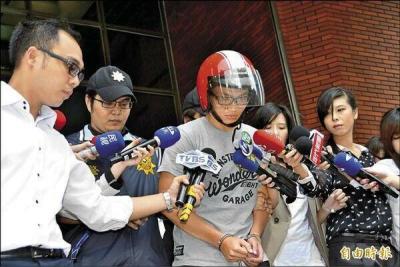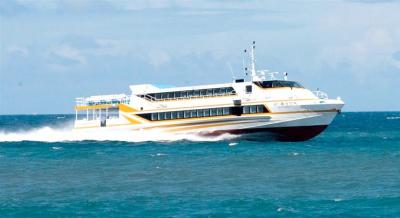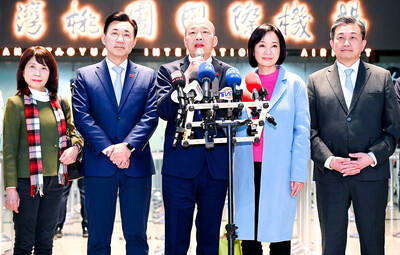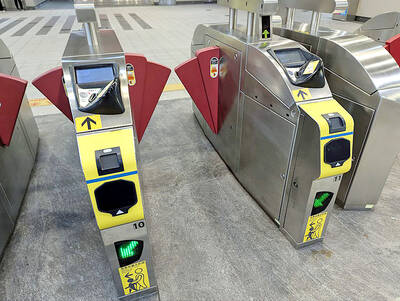The Presbyterian Church in Taiwan played a significant role in pushing for democracy during the Chinese Nationalist Party's (KMT) authoritarian rule.
When the nation celebrated the 20th anniversary of the lifting of martial law last month, little attention was paid to the "human rights declaration" proclaimed by the church 30 years ago.
Throughout the 1970s, the Presbyterian Church actively opposed political oppression, declaring a "human rights declaration" to help encourage the democratic movement that changed the fate of the country.
On Dec. 29, 1971, after then US secretary of state Henry Kissinger secretly visited Beijing, the church declared that the Taiwanese people had the right to self-determination. They asked the KMT government to implement democratic reforms, including direct elections for all representatives to the highest government body.
In the run-up to US president Gerald Ford's visit to China, the church on Nov. 18, 1975, called on the government to work on its diplomatic predicament and to establish a relationship of mutual trust with the church.
The call came after the KMT regime confiscated more than 2,000 Bibles translated by the church into Taiwanese using a Romanization system.
On Aug. 16, 1977, the church presented its human rights declaration, calling on the government to make Taiwan a "new and independent country" -- a revolutionary stance to take openly during the Martial Law Era.
The church, knowing that the US was making aggressive efforts to normalize relations with China, urged Washington under the administration of president Jimmy Carter to protect Taiwan and ensure its independence and freedom from China would continue. The church also took its call to the international community, the US public and churches around the world, spreading information about Taiwan's situation and the need for self-determination.
On Aug. 20, 1991, the church issued its own declaration on Taiwan's independence, urging Taipei to pen a new constitution, join the UN under the name "Taiwan" and reform its relationship to Beijing as an independent nation.
Reverend Andrew Chang (
Chang dismissed criticism that his church was too political, saying that an organization with a conscience could not sit idly and watch a maniac drive a truck-load of people over the edge of a cliff.
"We aren't getting involved in politics, we are just acting on our concern," he said.
Lee Shiao-feng (
Lee said that what some criticized as political engagement on the part of his church was in fact driven by Christian principles such as protecting the poor and disadvantaged.
"Jesus himself criticized the Romans and became a political prisoner," Lee said. "What [the church] did during KMT rule corresponded fully with the teaching of taking a stand in the face of injustice."
Lee said the Presbyterian Church made many other significant contributions to Taiwan, for example by distributing medicine, providing education and supporting local languages.
James Maxwell, a British Presbyterian missionary and physician, established Taiwan's first western medical clinic in Tainan in 1865, Lee said.
However, the church has often met resistance, including from its own members.
After the "human rights declaration" in 1977, Reverend William Lo (
Lo conceded feeling that his life was in danger during the Martial Law Era, but said he had never been afraid.
"There is no fear in love," the 66-year-old said.

Death row inmate Huang Lin-kai (黃麟凱), who was convicted for the double murder of his former girlfriend and her mother, is to be executed at the Taipei Detention Center tonight, the Ministry of Justice announced. Huang, who was a military conscript at the time, was convicted for the rape and murder of his ex-girlfriend, surnamed Wang (王), and the murder of her mother, after breaking into their home on Oct. 1, 2013. Prosecutors cited anger over the breakup and a dispute about money as the motives behind the double homicide. This is the first time that Minister of Justice Cheng Ming-chien (鄭銘謙) has

Ferry operators are planning to provide a total of 1,429 journeys between Taiwan proper and its offshore islands to meet increased travel demand during the upcoming Lunar New Year holiday, the Maritime and Port Bureau said yesterday. The available number of ferry journeys on eight routes from Saturday next week to Feb. 2 is expected to meet a maximum transport capacity of 289,414 passengers, the bureau said in a news release. Meanwhile, a total of 396 journeys on the "small three links," which are direct ferries connecting Taiwan's Kinmen and Lienchiang counties with China's Fujian Province, are also being planned to accommodate

BITTERLY COLD: The inauguration ceremony for US president-elect Donald Trump has been moved indoors due to cold weather, with the new venue lacking capacity A delegation of cross-party lawmakers from Taiwan, led by Legislative Speaker Han Kuo-yu (韓國瑜), for the inauguration of US president-elect Donald Trump, would not be able to attend the ceremony, as it is being moved indoors due to forecasts of intense cold weather in Washington tomorrow. The inauguration ceremony for Trump and US vice president-elect JD Vance is to be held inside the Capitol Rotunda, which has a capacity of about 2,000 people. A person familiar with the issue yesterday said although the outdoor inauguration ceremony has been relocated, Taiwan’s legislative delegation has decided to head off to Washington as scheduled. The delegation

TRANSPORT CONVENIENCE: The new ticket gates would accept a variety of mobile payment methods, and buses would be installed with QR code readers for ease of use New ticketing gates for the Taipei metro system are expected to begin service in October, allowing users to swipe with cellphones and select credit cards partnered with Taipei Rapid Transit Corp (TRTC), the company said on Tuesday. TRTC said its gates in use are experiencing difficulty due to their age, as they were first installed in 2007. Maintenance is increasingly expensive and challenging as the manufacturing of components is halted or becoming harder to find, the company said. Currently, the gates only accept EasyCard, iPass and electronic icash tickets, or one-time-use tickets purchased at kiosks, the company said. Since 2023, the company said it